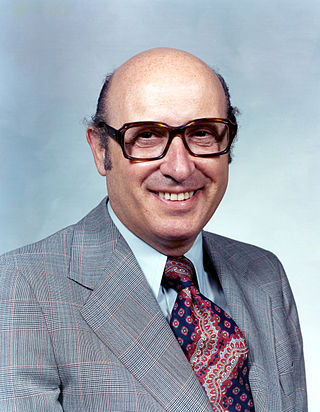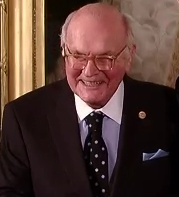
Robert Alan Frosch FREng was an American scientist who was the fifth administrator of NASA. He was the administrator from 1977 to 1981 during the Carter administration.

Harry Wesley Coover Jr. was the inventor of Eastman 910, commonly known as Super Glue.
Alfred Yi Cho is a Chinese-American electrical engineer, inventor, and optical engineer. He is the Adjunct Vice President of Semiconductor Research at Alcatel-Lucent's Bell Labs. He is known as the "father of molecular beam epitaxy"; a technique he developed at that facility in the late 1960s. He is also the co-inventor, with Federico Capasso of quantum cascade lasers at Bell Labs in 1994.

David John Teece is a New Zealand-born US-based organizational economist and the Professor in Global Business and director of the Tusher Center for the Management of Intellectual Capital at the Walter A. Haas School of Business at the University of California, Berkeley.
Roland Walter Schmitt was an American physicist, business executive and the sixteenth president of Rensselaer Polytechnic Institute.

Richard N. Foster, Managing Partner, Millbrook Management Group LLC – Foster is a former Director and Senior Partner with McKinsey & Company where he was responsible for serving clients in the U.S., Europe and Asia focusing on industry sectors including chemicals, electronics, healthcare, retail and consumer goods industries.

Rajendra K. Srivastava is Novartis Professor of Marketing Strategy and Innovation at the Indian School of Business. He has been a tenured professor and an academic administrator and has worked in the United States, Singapore, and India. He has been listed in the Forbes's Tycoons of Tomorrow 2018. He is also a member of the board of directors of Happiest Minds, a publicly listed company in India.

Uma Chowdhry was an American chemist whose career was spent in research and management positions with E. I. du Pont de Nemours and Company. She specialized in the science of ceramic materials, including catalysts, proton conductors, superconductors and ceramic packaging for microelectronics.
Andrew H. Van de Ven was an American organization scholar, and Professor Emeritus in the Carlson School of Management of the University of Minnesota.
The Journal of Life Sciences is a full-color bimonthly American magazine and daily website published in San Francisco since May 2007. Owned by Burrill & Company and the California Healthcare Institute, TJOLS reports on how developments in the life sciences affect society, business, and policy.
Edward Emil "Ed" David Jr. was an American electrical engineer who served as science advisor to President Richard M. Nixon and director of the White House Office of Science and Technology from 1970 to 1973.
Innovation Research Interchange (IRI) is a division of the National Association of Manufacturers, a nonprofit association based in Washington, D. C., United States. IRI was founded as a private non-profit association in 1938 and merged with the NAM in 2022. IRI's mission is "To enhance the innovation leader's and innovation teams' ability to create new value and growth by providing platforms and learning opportunities to share best and next practices, improving team and individual competencies, providing strategic information on the future of innovation execution and leadership, and enhancing and supporting a vibrant community for innovation leadership."

The IRI Achievement Award, established by the Industrial Research Institute (IRI) in 1973, is awarded "to honor outstanding accomplishment in individual creativity and innovation that contributes broadly to the development of industry and to the benefit of society." The recipient is first nominated by an IRI member organization for his or her invention, innovation, or process improvement, and then voted on by a nine-member Awards Committee, led by the immediate past-chairman of IRI's Board of Directors.

The IRI Medal, established by the Industrial Research Institute (IRI) in 1946, recognizes and honors leaders of technology for their outstanding accomplishments in technological innovation which contribute broadly to the development of industry and to the benefit of society. One side of the medal depicts a scientist peering into a microscope as a symbol of the never-ending quest for innovation; a pegasus running in the background as a symbol of imagination; and clouds issuing from a retort revealing the practical results of humanity's ability to harness natural forces to meet its needs. The reverse side of the medal is an adaptation of the official seal of the Institute. This award is traditionally presented each spring at the IRI Annual Meeting alongside the IRI Achievement Award.
The Research-on-Research (ROR) Committee was created by the Arlington, Virginia Industrial Research Institute in 1968 to fill in a perceived gap in the arena of technological research and development (R&D). The Committee oversees working groups which examine current research on a particular topic, to identify best practices for effective management of R&D. The working groups, under loose supervision by the Committee, meet several times a year, usually at IRI-sponsored events,. Their findings are typically published in IRI’s bimonthly journal, Research-Technology Management (RTM).
Industrial forensics is a holistic-based analytical and consultative response to problems encountered at any stage in the industrial manufacturing process. It differs from a traditional analytical approach that routinely identifies a problem and then reports the data in that its goal is to understand the problem, interpret the data and use those elements to prevent the problem from recurring. It is both prognostic and diagnostic. In its broadest sense, it is a holistic approach that examines each step in the product life cycle from initial R&D through final product and beyond to predict, identify, prevent and resolve manufacturing issues.
Candace A. Yano is Professor and Chair at Haas School of Business's Operations and Information Technology Management Group, and Professor and former Head of Department of Industrial Engineering & Operations Research, both at University of California, Berkeley. She is also a senior technical consultant on operations management issues for Yano Accountancy Corporation (YAC).
Johannes Willem "Johan" Schot is a Dutch historian working in the field of science and technology policy. A historian of technology and an expert in sustainability transitions, Johan Schot is Professor of Global Comparative History at the Centre for Global Challenges, Utrecht University. He is the Academic Director of the Transformative Innovation Policy Consortium (TIPC) and former Director of the Science Policy Research Unit (SPRU) at the University of Sussex. He was elected to the Royal Netherlands Academy of Arts and Sciences (KNAW) in 2009. He is the Principal Investigator of the Deep Transitions Lab.

Fortunato "Boy" Tanseco de la Peña is a Filipino engineer and professor who served as the Secretary of Science and Technology in the Cabinet of President Rodrigo Duterte from 2016 to 2022. Before he assumed leadership of the Department of Science and Technology (DOST), he was the Undersecretary for Scientific and Technological Services from 2001 to 2014. Except for his brief retirement from 2014 to 2016, he has been with the department since 1982.

Research Policy is a monthly peer-reviewed academic journal published by Elsevier on behalf of the Science Policy Research Unit. It was established by British economist Christopher Freeman in 1971 and is regarded as the leading journal in the field of innovation studies. It is listed as one of the 50 journals used by the Financial Times to compile its business-school research ranks.










